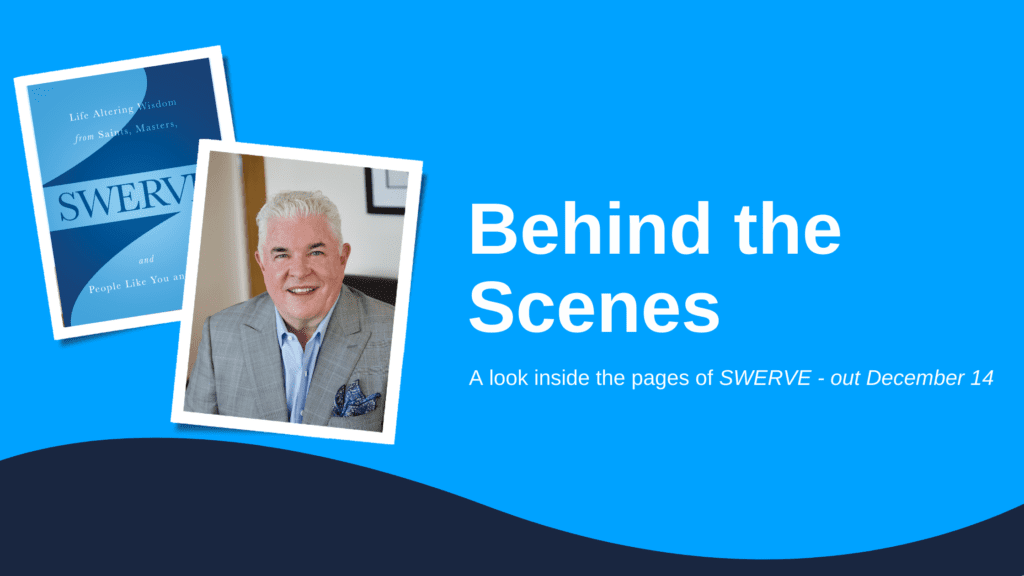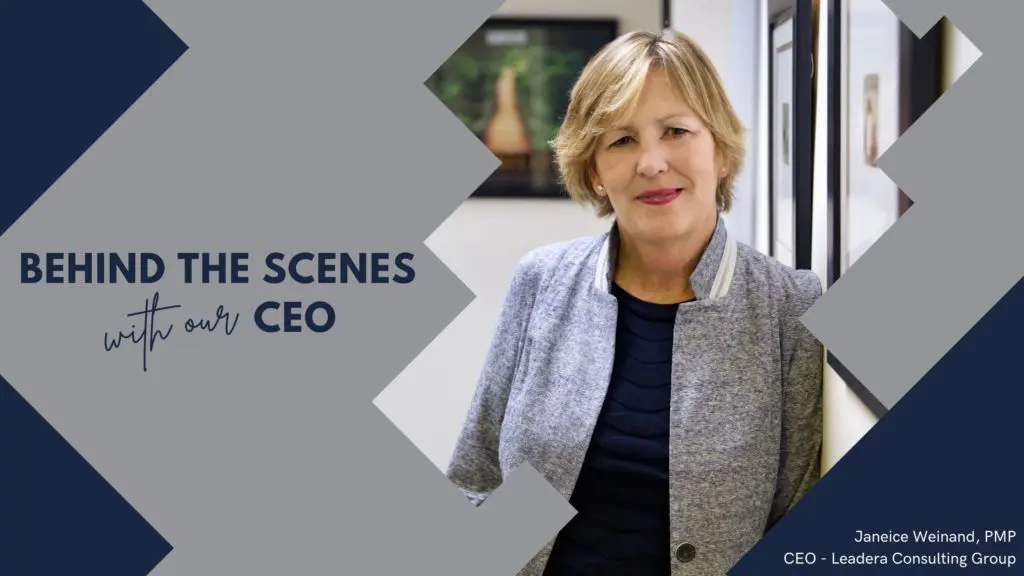
This month, SWERVE: Life Altering Wisdom from Saints, Masters, and People Like You and Me, written by Leadera president and master storyteller – Kevin Cullen, will hit bookshelves. To celebrate the upcoming release, we went behind the scenes with Kevin for a peek inside the book.
Pre-order your copy of SWERVE here.
Q. Tell us about SWERVE. What is the book about and who is it meant for?
A: It is about changing the course of the things in your life where you see a possibility or an opportunity, going after it and achieving it. It is meant for anyone who is willing to take on living a magical existence.
Q. Why this book? What made you want to write SWERVE?
A: I have a blessed life, truly in many ways it is unbelievable, lots of people ask me how I made it that way….I thought I would share some of the things that contributed to my growth and development as a human being and as a man.
Q. In the book, you share many life lessons you have learned over the years. Do you have a favorite lesson, and if yes, what makes it so?
A: Yes, the one I learned from Papaji (Guru in India). He said you should taste something sweet every day….it took me a while to figure out he wasn’t suggesting I eat more desserts.
Q. What sets SWERVE apart from other business books? Why should someone read it?
A: It will provoke you to think differently, which will have you speak differently, and in turn have you act differently.
Q. How does SWERVE fit into Leadera’s work with businesses and leaders?
A: The point of Swerve is to encourage or provoke the reader to consider things from a different perspective by shifting the way you might speak, think, or act.
Q. Tell us about your role at Leadera. What does a ‘day-in-the-life’ look like?
A: A boss gave me this advice about consulting once – he said look down at your feet….if they are in your office they are in the wrong building – no one here is going to buy consulting from you….go get in front of a client or a potential client. My average day looks like coaching clients, leading courses or talking to perspective clients.
Q. What is your favorite Leadera course?
A: Being an Exceptional Leader
Q: Why is leadership development important for both individuals and companies?
A: Leadership is about one thing – THE FUTURE. Management is about NOW, organizing, controlling, measuring, and making sure things happen the way they are supposed to according to plan. Leadership is about creating and inventing what is POSSIBLE and articulating it in such a way that people want to make it happen.
Q: What inspires you to do this work each day?
A: We work with some of the most remarkable people you could imagine. The work we do gives them a new perspective on what they do, how they do it, and who they are as they do it. When our work is done, our clients are more productive, more creative.
Q: What is your favorite way to spend downtime?
A: My passions, my interests, my hobbies, are: freshwater and deep sea fishing, sailing, art, live music, travel and my dogs.
Pre-order your copy of SWERVE here.
Read MoreHow to Re-Engage Your Team As We All Begin Coming Back to the Office

Did you know that seventy percent of all strategic program initiatives fail? While there is nothing like watching a team that is operating at full capacity and succeeding despite the high odds against them, a high-performance team doesn’t occur by accident. To prepare for future success, organizations must build their teams intentionally.
Having worked with hundreds of organizations, Leadera has discovered that much of the breakdown in teams and initiatives occurs in the way people work together ~ the way they communicate to and from each other; the way they support one another. The level of integrity that’s present amongst the team and in the project, as well as the way in which they each regard one another, are all elements on which the success of an initiative depends.
Leadera has identified and built its 2-day course ‘Building A High-Performance Team’ specifically to address the five essential practices for building high-performance teams, including:
1. Authentic Listening
This is much easier said than done, as most people think they are good listeners ~ not true. Authentic listening requires the ability to get in another’s world; not just their words, but the place from which they are speaking and understanding what they intend to say. Two good habits to develop this skill are: 1) give the speaker your undivided attention and 2) repeat back to the person what you heard and what you think their intention is in what they said. This gives the speaker an opportunity to confirm or correct your feedback.
2. Talking Straight
This means getting things up on the table that are difficult or uncomfortable to address ~ and to do it in such a way that people are left feeling respected, honored, and empowered. At the same time, it’s essential to get the issue (the “elephant in the room”) dealt with head on. It’s a fine line between confronting something that is difficult to talk about and doing so with the sensitivity it requires. This takes courage and grace at the same time.
3. Working as a Team
Watch any professional sports team that is working successfully and this becomes apparent. It requires a “pit crew” mentality. Each person on the team backs up, supports, and empowers the others. Their win belongs to each of them. “Your win is my win. Your loss is my loss.” They work together in such a way that extraordinary results take place. They back each other up and they support one another in difficult situations and circumstances. No one gets toppled by little things. Nothing gets in the way.
4. Honoring Your Word
If this practice doesn’t happen, you can forget the rest. This is simply working towards doing what you say you will do. It’s doing what you know to do, what’s expected, and what you know is right. Everybody knows how to do this ~ the question is, do they do it? Fundamental to this is cleaning it up when you don’t do what you said you would do. Clean it up immediately and move on.
5. Being Complete
The practice of being complete means that you don’t step over the trash. If something needs to be said, dealt with, or cleared up, it gets dealt with right away. The team understands that when you operate on top of issues, resentments, and things unsaid, everything comes to a grinding halt. This one is about getting things complete so they get clear, and there is a level of appreciation maintained by developing the practices of doing so. In sports, you see the guys in the dugout or on the court “high-fiving” each other with each little win throughout the game. This is no different than the importance of validating success and each win in the office.
Summary
Having these five practices in place provides you with the fundamental skills to build a high-performance team. We’ve seen that when teams have these five components working actively, the likelihood of success turns around dramatically from 70% likely to fail to 85% likely to succeed.
Leadera has a proven track record for successful project implementation when these five principles are utilized and present. We welcome the opportunity to bring the ‘Building a High-Performance Team’ course to your team and align it with the vision and values of your organization. For more information, reach out to us at the emails below.
——————————————
Kevin Cullen is President of Leadera Consulting Group, specializing in producing breakthrough business results. For more information on this course or other business challenges we help you solve, contact us at Leadera Consulting Group.
Kevin Cullen: kcullen@leaderacg.com

Did you know 70 percent of strategic initiatives in companies fail? Why is this? Research from studies point to four key contributing factors.
- People in the company do not know the vision and are not aligned with where the company needs to go.
- Employees do not understand their specific role in delivering on what the company is trying to accomplish.
- There isn’t a clear, transparent score card that is kept up-to-date, accurate, complete and in use.
- People are not being held accountable.
In studying project management effectiveness, we have found that when these four components are solidly in place the likelihood of success goes up dramatically. More importantly, what we’ve discovered with the initiatives that fail is it’s not that they’re missing a strong and believable plan, it’s that they didn’t build those four components into the design of the plan.
Additionally, we often find that project teams start with a plan but don’t stay committed to the plan. Worse yet, if the project goes off course even slightly, they might just abandon the plan because they don’t trust the process and the thinking that went into it. This is a fatal error and a rookie mistake. Teams have to believe in their plan.
Sticking to the plan takes courage and discipline because it’s human nature to doubt and want to change the plan when something unexpected comes along ~ which it almost always does. More and more today we have a strong need for immediate gratification. We want to see almost instant success and when we don’t get it, it triggers uncertainty and doubt so we question the plan.
Successful project execution requires managers and teams to trust the plan and to follow the steps in the plan. That means taking the next step in the plan, and the next step, and the next step. That is not to say there isn’t room to make adjustments. General Dwight D. Eisenhower said, “Only a fool goes into battle without a plan. But only an idiot follows the plan once the battle begins.” While you have to be able to make the right adjustments, that all happens inside staying the course of your original approach.
Nick Saban, head football coach at the University of Alabama, calls his plans on the field “The Process.” For Saban, “The Process” is all there is to winning and the way winning is accomplished. Sometimes you start executing the plan and something happens. Then suddenly people abandon the plan. People stop trusting the plan and stop trusting the process. They call an audible as a reaction to what they’re seeing in front of them.
Saban’s success can be attributed to staying the course and trusting the process. It almost doesn’t matter what you see at the line of scrimmage. He tells his players, “Ignore the scoreboard. Don’t worry about winning. Just focus on doing your job at the highest level every single play and the wins will follow.” He shows the player exactly how to do the move. He never sells out. When you believe in setting the right values and believe in your strategy, one of the hardest things to do is to stick with it in the face of circumstances in the foreground that are not what you want or expect. Staying the course when the going gets tough takes courage.
That 70% of failed initiatives are a function of abandoning the plan, the value is in sticking to the plan. Believe in yourself. Believe in the plan. Know in your gut that the plan is right and see it through to fulfillment. In organizations that give up on plans, and change mid-stream, a culture of not trusting occurs. People become disempowered. They think that management is presenting the “flavor of the month,” and that “this too shall pass.” It leaves a culture of people second-guessing themselves and quitting on the design and plans. People sell out easily in that scenario. There is enormous value in sticking with the plan. Focus on staying the course ~ that is what helps people, and organizations, win.
Read More
In honor of International Women’s Day, we went behind the scenes with Leadera’s CEO and all-around ‘get things done’ leader, Janeice Weinand.
Currently in its 11th year of business, Leadera provides performance-based consulting and leadership development services to businesses and organizations where collaboration and communication are essential to increasing value and gaining a competitive advantage.
As co-owner and CEO, Janeice specializes in performance-based leadership development and change management, coaching both rising and seasoned leaders, as well as entire teams and organizations, to achieve unprecedented business results.
Keep reading below for our Q&A with Janeice on all things leadership and Leadera.
Q: Tell us about your role at Leadera. What does a ‘day-in-the-life’ look like?
A: In our business, every day is different. From day-to-day or even from morning to afternoon, I may be working one-on-one with clients, designing new programs, updating courses, or running the back end of the business.
Q: What is your favorite Leadera course, and why?
A: The ‘Being a Leader’ course. While it may sound “trite,” it is a truly life-altering course – in the best way.
We are currently gearing up for our first-ever virtual ‘Being a Leader’ course. I’m really excited to open registration on this course. We have seen how vital leadership is over the course of events this past year, as companies have had to pivot organizations and teams during unprecedented events.
‘Being a Leader’ builds leaders for these types of pivots on a foundational level, creating a way of being that allows participants to exercise leadership freely and effectively as their natural self-expression, rather than providing a list of tools and rules to follow.
Q: What is a leadership book you would recommend, and why?
A: Our Iceberg is Melting by John Kotter. It is a charming book that illustrates key truths about how to deal with change.
Q: Why is leadership development important for both individuals and companies?
A: There are many studies that show companies who invest in developing current and future leaders are significantly more productive, have higher retention rates, and overall a more satisfied workforce. I believe that leadership begins with leading yourself and that is a powerful place to be.
Q: What sets Leadera apart in its industry?
A: We work hand-in-hand with our clients to customize engagements to fit an organization’s needs. We believe that all individuals, teams, and organizations have the ability to go beyond what’s expected. Our work is truly a comprehensive revolution that inspires people to think differently, problem-solve effectively, and achieve the extraordinary.
Q: What inspires you to do this work each day?
A: I get to make a profound difference in people’s lives. I’ve seen first-hand the extraordinary results of those who have committed to development and gone through our courses. Seeing that motivates me each day to continue this work.
Q: What women leaders inspire you, and why?
A: Wow, there are a lot. If I look locally, Susan Dray, the new 2021 Chair of the Board for the Greater Houston Women’s Chamber of Commerce, is one. She and the Chamber have many initiatives they are taking on this year, including the support of small businesses which can make a profound difference in the community.
Q: What is your favorite way to spend downtime?
With my two Australian Shepherd dogs, who are 2 and 3. They are a handful and a joy to play with!
To reach Janeice, or learn more information about Leadera’s ‘Being a Leader’ course, you may contact Janeice directly at: jweinand@leaderacg.com (cc: acook@leaderacg.com).
Read More
Unconscious bias is a preferential tendency of which we are unaware and that often operates outside of our control. It is an automatic judgment that is triggered in our brains and heavily influenced by our backgrounds, cultural environments, and personal experiences. It causes a filter that shapes the way we look at the world, how we think, how we speak, and ultimately how we act. It operates as a decision-making mechanism without our being aware of it.
Science and numerous studies have shown that ingrained unconscious bias can be rewired. It starts with recognition and awareness. Below are 4 types of unconscious bias that research has found directly impact the workplace. Keep reading to learn what they are and how they may affect your organization.
1. Affinity Bias – The tendency to warm up to people like ourselves.
The benefit of Affinity Bias is that it is comfortable and easy. The real impact on an organization is that it excludes others and results in alienation.
2. Halo Effect – The tendency to think everything about a person is good because you like that person.
With the Halo Effect, we tend to put people on a pedestal. It cases us to make snap judgements. If you likeone aspect of something to do with a person, you’ll have a positive predisposition towards everything else; if you dislike one aspect, you’ll have a negative predisposition.
3. Confirmation Bias – The tendency for people to seek information that confirms pre-existing beliefs or assumptions.
The benefit of Confirmation Bias is that it helps form a resolute opinion and creates agreement to past beliefs without much thought to the matter. The impact on an organization is it all but stagnates innovation and creativity.
4. Group Think – Occurs when people try too hard to fit into a particular group by mimicking others or holding back thoughts and opinions.
Group Think can be comfortable and allows us to ‘fit in’ with whichever team/organization we currently find ourselves in. The impact, however, is a loss of personal identify, creativity and innovation.[1]
We do not have unconscious bias because we are bad or flawed people – we have it because we are human.
Empower your organization by gaining a deeper understanding of unconscious bias and fostering an inclusive and diverse workforce. The Leadera Disrupting Unconscious Bias: Recognition and Awareness course is an engaging 4-hour webinar that explores the depths and impact of unconscious bias in our personal and professional lives.
Through a series of interactive conversations and exercises, participants in this program will discover where these biases come from, their function, and how they can limit or expand our performance and connection with others.
By participating in this course, people gain an awareness and acquire a set of practices that leave them with a powerful choice as to the type of person they want to be and the type of relationships they wish to have.
For more information on this course, or other business challenges we can help you solve, contact us at Leadera Consulting Group. Kevin Cullen: kcullen@leaderacg.com, cc: acook@leaderacg.com
[1] McCormick, H. The Real Effects of Unconscious Bias in the Workplace. 2016. http://execdev.kenan-flagler.unc.edu/hubfs/White%20Papers/Unconscious-Bias-in-the-Workplace.pdf
Read More